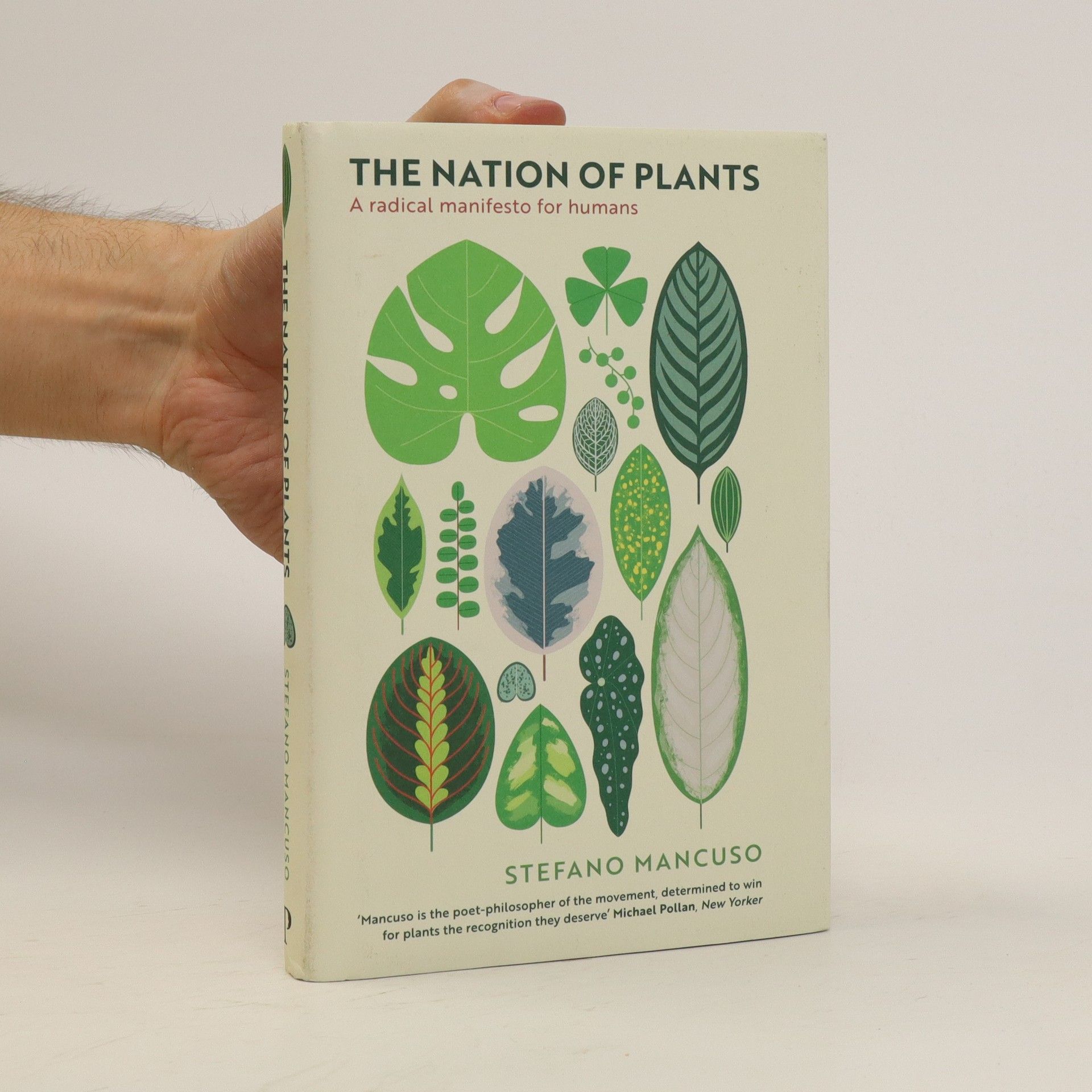Les plantes sont-elles intelligentes ? Oui, et bien plus que nous ne pourrions l'imaginer, nous répond Stefano Mancuso. Savant de renommée mondiale, fondateur de la neurobiologie végétale, il est le premier à avoir démontré que, comme tous les êtres vivants, les plantes discernent formes et couleurs, mémorisent des données, communiquent. Elles ont une personnalité et développent une forme de vie sociale basée sur l'entraide et l'échange. Véritable manifeste écologique, ce livre pionnier, qui a bénéficié d'une reconnaissance internationale, nous plonge dans un incroyable voyage au coeur du monde végétal. Un monde qui, en formant plus de 99 % de la biomasse, s'avère aujourd'hui indispensable pour l'humanité. Car si les plantes peuvent très bien vivre sans nous, nous ne survivrions pas longtemps sans elles ! A l'heure où l'on recherche d'autres modes de vie, où les ressources naturelles s'épuisent, nous avons tout à apprendre du monde végétal dont dépendent la survie et l'avenir de l'homme.
Stefano Mancuso Livres
Stefano Mancuso explore le monde fascinant et souvent négligé des plantes. Par ses recherches, il cherche à dévoiler les capacités cachées des plantes, de leur perception à leur communication, les présentant comme des êtres intelligents. Son travail remet en question les visions traditionnelles du règne végétal, encourageant les lecteurs à réévaluer la complexité de la vie sur Terre. Il vise à nous montrer que les plantes mènent des vies bien plus sophistiquées que ce que l'on perçoit communément.







The remarkable stories of trees that have shaped human history - from the wooden ladder that solved a crime to France's revolutionary Liberty Trees.
The Incredible Journey of Plants
- 176pages
- 7 heures de lecture
In this richly illustrated volume, a leading neurobiologist presents captivating stories of plant migration that reveal unexpected connections between nature and culture. Understanding plant migration helps us grasp the unstoppable nature of these phenomena. Plants exhibit a relentless drive to spread life, colonizing every possible environment on Earth. This history of expansion is largely unknown, but through engaging tales, we begin to explore it. Generation after generation, plants move using spores, seeds, and various means to conquer new spaces. They release vast quantities of spores that can travel thousands of miles. The diversity of seed dispersal methods is astonishing: seeds can be carried by wind, animals, water, or simply fall from the plant through various mechanisms. This accessible overview examines how plants entice animals to aid in their spread, how some depend on specific animals, and how they thrive in isolated and inhospitable locations. It also highlights their resilience, surviving events like the atomic bomb and the Chernobyl disaster, their ability to bring life to barren islands, and their capacity to traverse ages as they journey around the globe.
This playful manifesto - presented for the plant nation by a leading neurobiologist - is an international bestseller.
As plants see it, humans are not the masters of the Earth but only one of its most unpleasant and irksome residents. They have been on the planet for only about 300,000 years ago (nothing compared to the three billon years of plant evolution), yet have changed the conditions of the planet so drastically as to make it a dangerous place for their own survival. It's time for the plants to offer advice. In this playful, philosophical manifesto, Stefano Mancuso, expert on plant intelligence, presents a new constitution on which to build our future as beings respectful of the Earth and its inhabitants. These eight articles - the fundamental pillars on which plant life is based - must henceforth regulate all living beings.
With fun, fascinating vignettes, a renowned neurobiologist illuminates the interconnectedness of plant life and how we can learn from it to better plan our communities. We animals account for a paltry 0.3% of the planet’s biomass while plants add up to 85%. And when, with just a little training, we are able to look at the world without seeing it solely as humanity’s playground, we cannot help but notice the ubiquity of plants. They are everywhere, and their stories are inevitably bound up with ours. As every tree in a forest is linked to all the others by an underground network of roots, uniting them to form a super organism, so plants constitute the nervous system, the plan that is the “greenprint” of our world. To ignore the existence of this plan is one of the most serious threats to the survival of our species. In this latest book, the brilliant Stefano Mancuso is back to illuminate the greenprint of our world. He does it through unforgettable stories starring plants that combine an inimitable narrative style with remarkable scientific rigor, from the story of the red spruce that gave Stradivarius the wood for his fourteen violins, to the Kauri tree stump, kept alive for decades by the interconnected root system of nearby trees. From the mystery of the slipperiness of the banana skin to the plant that solved the “crime of the century,” the Lindbergh kidnapping, by way of wooden ladder rungs.
Vnímavá zeleň
- 144pages
- 6 heures de lecture
Jsou rostliny inteligentní bytosti? Dokážou komunikovat a řešit problémy, nebo jsou pouhou součástí světa bez citlivosti? Autoři zkoumají fascinující svět rostlin a dokazují, že nejsou organismy nižšího řádu. Rostliny mají svou osobnost, pět smyslů, vzájemně si předávají informace a interagují se zvířaty. Využívají strategie přežití, vedou sociální život a efektivně hospodaří s energetickými zdroji. Dovedou volit, učit se a pamatovat si. Inteligence, schopnost učení, paměť a komunikace nejsou výsadou živočišného světa. Tato publikace osvětluje, jak rostliny tyto vlastnosti sdílejí s námi. Hrají nezastupitelnou roli v našem životě, bez nich nemůžeme existovat a můžeme se od nich mnoho naučit. Díky svým schopnostem roste jejich význam ve vědě a technologiích budoucnosti. Kniha získala v roce 2013 Národní cenu pro popularizaci vědy Italské asociace pro knihu a byla přeložena do několika jazyků. Stefano Mancuso, vedoucí Mezinárodní laboratoře rostlinné neurobiologie na Univerzitě ve Florencii, je uznávaným odborníkem a zakládajícím členem International Society for Plant Signaling and Behavior. Alessandra Violová, novinářka specializující se na popularizaci vědy, se podílela na Festivalu živé vědy a spolupracuje se státní televizí RAI.
Ohne die Pflanzen, die uns mit Nahrung, Energie und Sauerstoff versorgen, könnten wir Menschen auf der Erde nicht einmal Wochen überleben. Merkwürdig eigentlich, dass sie trotzdem lange als Lebewesen niederer Ordnung galten, knapp oberhalb der unbelebten Welt. Erst seit kurzem erkennt die Forschung, was schon Darwin vermutete: dass Pflanzen trotz ihrer (scheinbaren) Unbeweglichkeit über stupende Fähigkeiten verfügen, ja über Intelligenz. Denn außer den fünf Sinnen des Menschen besitzen sie noch mindestens 15 weitere, mit denen sie nicht nur elektromagnetische Felder erspüren und die Schwerkraft berechnen, sondern zahlreiche chemische Stoffe ihrer Umwelt analysieren können. Mit Duftstoffen warnen sie sich vor Fressfeinden oder locken Tiere an, die sie davon befreien; über die Wurzeln bilden sie riesige Netzwerke, in denen Informationen über den Zustand der Umwelt zirkulieren. Ohne Organe können sie so über eine Form von Schwarmintelligenz Strategien entwickeln, die ihr Überleben sichern. Von wegen »vegetieren«! Ein besseres Verständnis der Intelligenz der Pflanzen könnte uns lehren, auf Pestizide zu verzichten, ja bessere Computer und Netzwerke zu entwickeln, meint der renommierte Pflanzenforscher Stefano Mancuso, der uns in diesem Buch anschaulich und voller Leidenschaft eine unbekannte Welt eröffnet.
Pflanzenrevolution
Wie die Pflanzen unsere Zukunft erfinden
Um unsere eigene Zukunft auf der Erde zu sichern, müssen wir uns von den Pflanzen inspirieren lassen. In seinem neuen Buch entwickelt Stefano Mancuso eine revolutionäre Sicht auf die Pflanzenwelt. Denn Pflanzen haben in Jahrmillionen vollkommen andere Überlebensstrategien entwickelt als wir: Wo der Mensch auf zentralisierte, hierarchische Lösungen setzt, handeln Pflanzen flexibel, dezentral und als Gemeinschaft. Sie verbrauchen sehr wenig Energie, überleben unter extremen Bedingungen, lernen aus Erfahrung und haben dabei Tausende Lösungen gefunden, die ganz anders sind als die der uns vertrauteren Tierwelt. Wie die Pflanze Licht einfängt und Energie nutzt, dient schon heute der Architektur als Inspiration; wie das Wurzelgeflecht Informationen aufschließt und verarbeitet, macht es zum Modelleines kollektiven Organismus. Von der Konstruktion neuer Roboter bis zur Organisation von großen Gemeinschaften gibt es keine bessere Inspirationsquelle als die Pflanzen. Die Strategien, mit denen sie ihre Funktionen regeln, sind ein außergewöhnlich effizientes Paradigma für ein nachhaltiges Leben, für eine demokratische Zukunft.
In diesem Buch stellt Stefano Mancuso Entdecker vor, die sich den Pflanzen mit Leidenschaft gewidmet haben – eine inspirierende Anthologie, ein Geschenk für jeden Naturliebhaber. Ein neuer Blick für die Natur, leidenschaftliche Aufmerksamkeit und Forschergeist können unsere Vorstellung von der Welt verändern. Der Biologe Stefano Mancuso lässt in seinem neuen Buch Botaniker, Genetiker und Philosophen, aber auch Landwirte und schlichte Liebhaber aus fünf Jahrhunderten Revue passieren, denen aus inbrünstiger Beschäftigung mit der Welt der Pflanzen entscheidende Entdeckungen gelangen. Da ist George Washington Carver, der als erster Schwarzer an einer Universität studiert und die Amerikaner von der Essbarkeit der Erdnuss überzeugt. Oder Nikolai Wawilow, der Russland durch eine gigantische Samenbank Nahrungssicherheit schenken will – und selbst in einem Gefängnis Stalins verhungert. Darwin entwickelt eine »Theorie zum Wurzelgehirn«; Leonardo da Vinci studiert, wie Blätter Sonnenlicht einfangen; Goethe ist, auf der Suche nach der Urpflanze, dem einheitlichen Organisationsplan des Lebens auf der Spur. Wahre »Amateure« sind sie alle, die als »liebende Forscher« einen neuen Blick wagten und damit zu Pionieren wurden. Mancusos inspirierende Anthologie der Begeisterung und zugleich selbst ein überzeugendes Plädoyer dafür, die Naturforschung aus den Händen der Molekularbiologen zu erretten.



